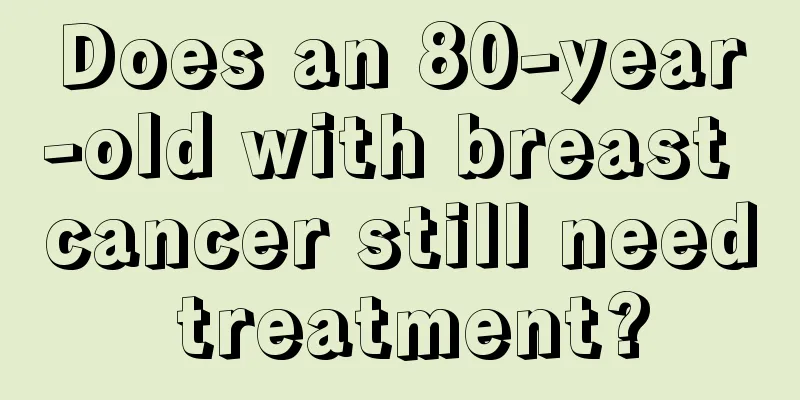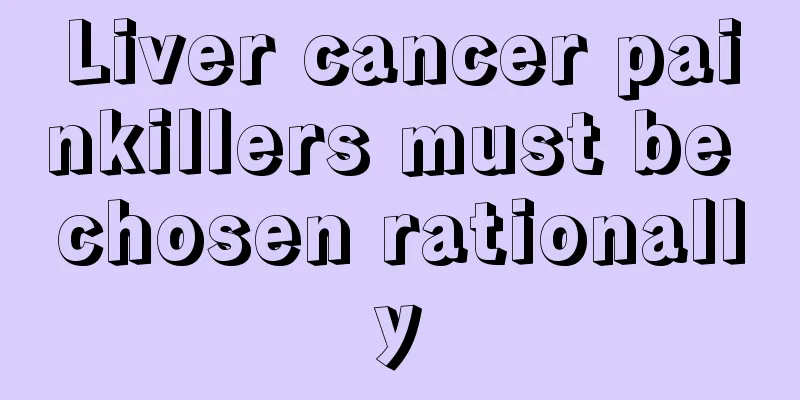Does an 80-year-old with breast cancer still need treatment?

|
Breast cancer at the age of 80 still needs treatment, but the treatment plan should vary from person to person based on physical condition, cancer stage and personal needs. Treatment can be surgery, drugs, radiotherapy or supportive care, but the tolerance and quality of life of the elderly must be considered comprehensively. 1. Why do people at the age of 80 still need to be treated for breast cancer? Even in elderly patients, breast cancer can still progress and threaten life, and it can also cause complications such as pain and infection, which can reduce the quality of life. Modern medicine has safe treatments for elderly patients, and it is very important to specifically reduce the burden of the disease and maintain the quality of life. Physical condition assessment The focus of treatment for elderly patients is to assess their overall health, including heart function, liver and kidney function, etc. If the patient is relatively healthy and the cancer is still in the early stages, the treatment effect is expected to be better. Even if the disease is in the late stage, symptoms can be controlled through palliative treatment. 2. What are the specific treatment methods? For patients aged 80, treatment options mainly include the following three aspects: (1) Surgical treatment For patients who are in good physical condition, surgery to remove the tumor may be considered. This is usually suitable for localized breast cancer, and the type of surgery may include lumpectomy (breast-conserving surgery) or mastectomy. Before surgery, the patient needs to be carefully evaluated to reduce the risks of surgery. (2) Drug treatment Drug therapy is an important approach for elderly patients: - Endocrine therapy: If the breast cancer is hormone receptor-positive, tamoxifen or aromatase inhibitors may be used, which have fewer side effects and are more effective. -Targeted therapy: For patients with HER2-positive breast cancer, targeted drugs such as Herceptin (trastuzumab) may be used. -Chemotherapy: Generally not the first choice for patients over 80 years old, unless the tumor is rapidly progressing and life-threatening, low-toxic drugs can be selected. (3) Radiotherapy or supportive treatment If surgery or drug treatment is not suitable, local radiotherapy can be chosen to relieve tumor symptoms. Supportive treatments such as pain relief, psychological support, and nutritional management are also very important. 3. Balance between efficacy and quality of life Elderly cancer patients need to pay more attention to their overall quality of life than younger patients. Before formulating a treatment plan, it is recommended to communicate in depth with family members and doctors to understand the disease status and treatment goals, and to rationally choose treatment methods. By comprehensively assessing health status, disease stage and patient wishes, 80-year-old patients can still prolong their lifespan and improve their quality of life through personalized treatment plans. The key to treatment is to minimize pain and symptoms and protect the patient's dignity and autonomy. Regardless of the treatment chosen, regular follow-up and professional advice are indispensable guarantees. |
<<: Does bladder cancer T2 have a big impact on life expectancy?
>>: Do I need chemotherapy after cancer surgery?
Recommend
What to eat to get rid of acne
Although acne is a common occurrence on a person&...
Does papaya really have the effect of breast enhancement?
It is almost universally recognized that papaya c...
What causes ear pain
Earache is not a single disease. There are many c...
How to treat liver cancer? A review of 5 professional liver cancer treatment methods
1. Surgical treatment There is no doubt that surg...
How to take care of hair after shaving
Hair is the human body's own tool to resist t...
What are the black bugs in rice called
In our lives, if we buy a lot of rice at home and...
What to eat to prevent breast cancer
What is good to eat to prevent breast cancer? In ...
Dietary taboos for patients with cervical cancer
Cervical cancer diet issues still need to be note...
How does blood flow in the heart
Blood keeps flowing in the blood vessels, which i...
What are the symptoms of patients with advanced lung cancer? 4 clinical symptoms of advanced lung cancer
The most common symptoms of patients with advance...
How to choose a hospital for ovarian tumor treatment
In recent years, with the increasing incidence an...
AIDS necessary conditions
AIDS is a very serious disease and is highly cont...
How to remove black spots on clothes?
In the hot summer, everyone likes to wear white c...
Is blood purification harmful?
Blood purification is a common means of medical t...
How is the treatment for nasopharyngeal carcinoma stage 4a?
Nasopharyngeal carcinoma is a common malignant ca...









